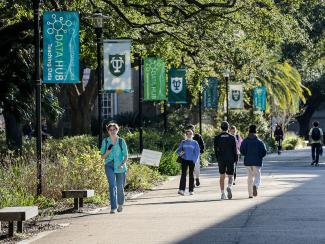The Data Hub, Tulane’s new Center for Data Literacy, is an educational endeavor that the university has created as its Quality Enhancement Plan (QEP) for reaccreditation by the Southern Association of Colleges and Schools (SACS).
“One of the requirements for reaccreditation is that we create a Quality Enhancement Plan, a new endeavor that dramatically improves the educational experience of a sizable percentage of our students,” said Robin Forman, senior vice president for academic affairs and provost.
When Forman asked faculty and staff from across the campus their thoughts on several possible themes for the QEP, data literacy emerged as the top contender.
“Several folks explicitly talked about COVID-19,” said Forman. “Every day we were seeing statistics on the spread of infection and the demographics of hospitalizations, which made it increasingly clear that you need to be able to think with and about data in order to make informed decisions about your own health and safety and that of your community.
“The same could be said about many crucial questions of public policy,” Forman added, “so this QEP is, in part, about fulfilling our role to educate engaged, informed citizens.”
Data-intensive discovery has become a fundamental method of inquiry across academic disciplines and drives decision-making across industries. “The 21st century is in many ways the century of data science,” said Forman. “Data literacy is now essential for a broad array of professional opportunities.”































































